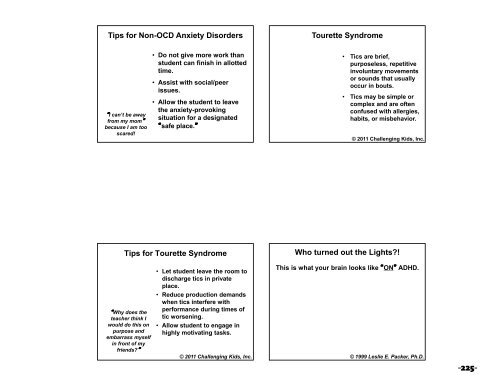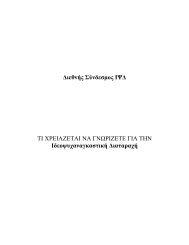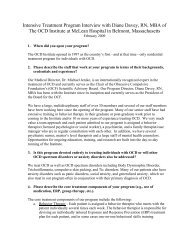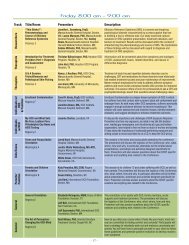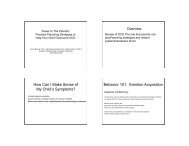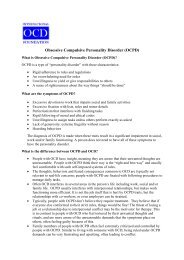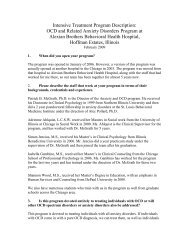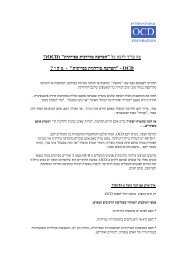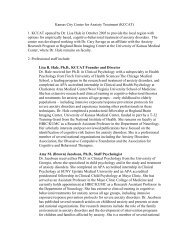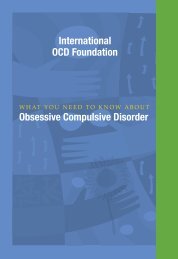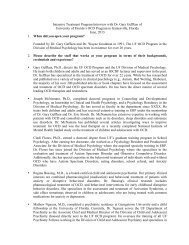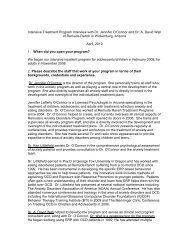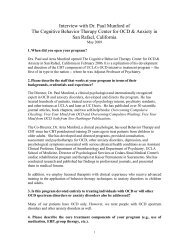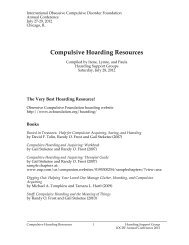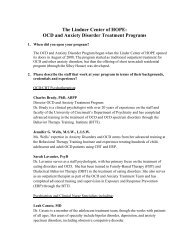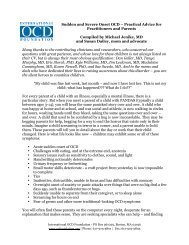- Page 1:
-1-
- Page 4 and 5:
IMAGINE THAT!: A SCRIPTING WORK- SH
- Page 6 and 7:
Themes and Variations - Theoretical
- Page 8 and 9:
-5- 3
- Page 10 and 11:
-7- 5
- Page 12 and 13:
Themes and Variations - Theoretical
- Page 14 and 15:
6/14/13 -11- 3
- Page 16 and 17:
6/14/13 5 -13-
- Page 18 and 19:
6/14/13 -15- 7
- Page 20 and 21:
6/14/13 • Subjects (N = 20) with
- Page 22 and 23:
The Social Experiment 6/14/13 The
- Page 24 and 25:
6/14/13 How Do We Treat Social
- Page 26 and 27:
6/14/13 Exposure therapy is: A
- Page 28 and 29:
6/14/13 Detailed Inves5ga5on of
- Page 30 and 31:
6/14/13 Why Imaginal Exposure
- Page 32 and 33:
6/14/13! Common obsessions, continu
- Page 34 and 35:
6/14/13! 1# This circuit is called
- Page 36 and 37:
6/14/13! -33- 6!
- Page 38 and 39:
6/14/13! People with OCD experience
- Page 40 and 41:
6/14/13! 1a. Behavior Therapy! •
- Page 42 and 43:
ERP Exposed OCD Cycle Obsessions Re
- Page 44 and 45:
OCD Definition: OCD Cycle COMPULSIO
- Page 46 and 47:
Somatic Obsessions Miscellaneous Ob
- Page 48 and 49:
Exposure and Response Prevention -
- Page 50 and 51:
Strategic Model of Cognitive Treatm
- Page 52 and 53:
Segment 3 Every step of the way, ch
- Page 54 and 55:
You also have to tolerate anxiety
- Page 56 and 57:
Segment 9 Segment 10 Habituation re
- Page 58 and 59:
Get rapport (and get it again) Get
- Page 60 and 61:
6/14/13 Example #2: “Dave”
- Page 62 and 63:
6/14/13 Talking about Accommoda@o
- Page 64 and 65:
6/14/13 Making Decisions about A
- Page 66 and 67:
6/14/13 Dealing with Arguments
- Page 68 and 69:
Ask an Attorney - What Are My Right
- Page 70 and 71:
What is a major life activity Basic
- Page 72 and 73:
What is Reasonable Accommodation Mo
- Page 74 and 75:
Family and M edical L A eave ct IOC
- Page 76 and 77:
THE SPENCER LAW FIRM 2727 Camino de
- Page 78 and 79:
Importantly, the ADA requires cover
- Page 80 and 81:
Some possible reasonable accommodat
- Page 82 and 83:
THE SPENCER LAW FIRM 2727 Camino de
- Page 84 and 85:
insurance, sick leave, education be
- Page 86 and 87:
Protection and Advocacy The Protect
- Page 88 and 89:
Can’t - vs. -Won’t • If you s
- Page 90 and 91:
Rewards Fear Stimulus CBT Model of
- Page 92 and 93:
My Child-Brother-Sister Has OCD But
- Page 94 and 95:
I’m Afraid I’m Really Gonna Do
- Page 96 and 97:
Roger is a 52 year old widowed dent
- Page 98 and 99:
Fear of loss of impulse control: B:
- Page 100 and 101:
Fear of loss of impulse control ERP
- Page 102 and 103:
Sandra Practices walking with delay
- Page 104 and 105:
-101- 11
- Page 106 and 107:
6/14/13 Defining the Problem- Raci
- Page 108 and 109:
6/14/13 Time for ERP Separation A
- Page 110 and 111:
Manipulating Language to Improve Pa
- Page 112 and 113:
6/24/13 SHIFT LANGUAGE TO PROMOTE H
- Page 114 and 115:
6/24/13 LABEL ANXIETY AND OCD Agai
- Page 116 and 117:
The BDD Challenge 6/14/13 The BDD C
- Page 118 and 119:
6/14/13 WHICH BODY PARTS ASSOCIATED
- Page 120 and 121:
6/14/13 WHAT DOESN’T APPEAR TO WO
- Page 122 and 123:
6/14/13 COGNITIVE THERAPY CONT. IDE
- Page 124 and 125:
6/14/13 ERP HIERARCHY #1 BDD ISSUE:
- Page 126 and 127:
6/14/13 IN CLOSING EDUCATION TREA
- Page 128 and 129:
6/14/13 FAMILY ACCOMMODATION & MAIN
- Page 130 and 131:
6/14/13 HMO HMO = Health Maintenan
- Page 132 and 133:
6/14/13 RECOGNIZE THE SIGNS OF OCD
- Page 134 and 135:
6/14/13 COLLABORATING WITH SCHOOLS
- Page 136 and 137:
Conceptualizing and Treating Hoardi
- Page 138 and 139:
6/24/13 DSM-‐5 criteria for
- Page 140 and 141:
6/24/13 Family Burden • Growin
- Page 142 and 143:
6/24/13 Biological vulnerability
- Page 144 and 145:
6/24/13 • Depression • Self-
- Page 146 and 147:
6/24/13 Mo8va8on and Ambivalence
- Page 148 and 149:
6/24/13 Skills Training: Objec8ve
- Page 150 and 151:
6/24/13 Behavioral Experiment: C
- Page 152 and 153:
6/24/13 Treatment Responders (%)
- Page 154 and 155:
Perfecting Perfectionism Perfecting
- Page 156 and 157:
Types of Perfectionism Being th
- Page 158 and 159:
Healthy Perfectionism In general
- Page 160 and 161:
The cost of perfectionism • T
- Page 162 and 163:
Let’s Focus on Two Problemati
- Page 164 and 165:
• Are we there yet • The r
- Page 166 and 167:
Addressing Relapse in CBT for OCD 6
- Page 168 and 169:
6/14/13 Lisa’s Exposure Hierar
- Page 170 and 171:
6/14/13 Is Performance During E
- Page 172 and 173:
6/14/13 Frame ERP to Mismatch
- Page 174 and 175:
6/14/13 Implica:ons for Psychoed
- Page 176 and 177:
6/14/13 -173- 2
- Page 178 and 179: 6/14/13 -175- 4
- Page 180 and 181: 6/14/13 -177- 6
- Page 182 and 183: 6/14/13 -179- 8
- Page 184 and 185: 6/14/13 -181- 1 0
- Page 186 and 187: 6/14/13 -183- 1 2
- Page 188 and 189: 6/14/13 -185- 1 4
- Page 190 and 191: 6/14/13 -187- 1 6
- Page 192 and 193: 6/14/13 -189- 1 8
- Page 194 and 195: 6/14/13 -191- 2 0
- Page 196 and 197: 6/14/13 Jenny Jenny • Referred
- Page 198 and 199: 6/14/13 Appraisals of intrusions
- Page 200 and 201: 6/14/13 Bill • His intrusive
- Page 202 and 203: 6/14/13 Response Prevenaon • D
- Page 204 and 205: 6/14/13 Study Comparing Individual
- Page 206 and 207: 6/14/13 Exclusionary Criteria Struc
- Page 208 and 209: 6/14/13 Contact Information The OCD
- Page 210 and 211: 6/14/13 Acceptance vs. Change Chan
- Page 212 and 213: 6/14/13 Positive Reacting Styles P
- Page 214 and 215: 6/14/13 What is P-N-P What is P-N-
- Page 216 and 217: People and Places - Emotional Conta
- Page 218 and 219: 6/14/13 CASE EXAMPLE • 67 year
- Page 220 and 221: 6/14/13 THE ROLE OF BETRAYAL
- Page 222 and 223: 6/14/13 THE ROLE OF ACCEPTANCE
- Page 224 and 225: Challenging Kids Challenged Adults
- Page 226 and 227: Regulatory Disorders Challenging Ki
- Page 230 and 231: Sleep Problems Tips for Sleep Probl
- Page 232 and 233: EXECUTIVE FUNCTION “He is such a
- Page 234 and 235: Write It or Regret It! CL UE Tips f
- Page 236 and 237: Slow Processing Speed (Sluggish Cog
- Page 238 and 239: Tips for Handwriting • Reduce cop
- Page 240 and 241: Curiosity vs Judgment! © Sheryl K.
- Page 242 and 243: Prepare the child for the path….
- Page 244 and 245: How Can the Whole Family Fight OCD
- Page 246 and 247: Task Description & Reminder of spec
- Page 248 and 249: Using Scaffolding Steps in Unplanne
- Page 250 and 251: 6/14/13 Examples of Behavioral
- Page 252 and 253: Assessment and Treatment of Postpar
- Page 254 and 255: Cognitive-Behavioral Strategies in
- Page 256 and 257: 6/14/13 iCompulsions (OCD) or Cyber
- Page 258 and 259: 6/14/13 Similarities Between HC and
- Page 260 and 261: 6/14/13 C = Increased Fear and Doub
- Page 262 and 263: 6/14/13 Sample Exposures For Health
- Page 264 and 265: 6/14/13 The Effect of Attention (Ta
- Page 266 and 267: 6/14/13 Health-Related OCD Case Exa
- Page 268 and 269: 6/14/13 Treatment • Stop all comp
- Page 270 and 271: -267-
- Page 272 and 273: -269-
- Page 274 and 275: -271-
- Page 276 and 277: -273-
- Page 278 and 279:
-275-
- Page 280 and 281:
-277-
- Page 282 and 283:
So You Expect Them to Leave Home So
- Page 284 and 285:
Daniel G. Pruitt, Jr., PCC, SCAC In
- Page 286 and 287:
NEEDED TRANSITION SKILLS: • Time
- Page 288 and 289:
Memory Functioning CL UE Short-Term
- Page 290 and 291:
Taking Medications Exercise! •Und
- Page 292 and 293:
Washer and Dryer TRANSITION SKILLS:
- Page 294 and 295:
TRANSITION SKILLS: Ready ! Money Ma
- Page 296 and 297:
TRANSITION SKILLS: • Tell them wh
- Page 298 and 299:
TRANSITION SKILLS: This Isn’t It!
- Page 300 and 301:
Tigers, Too Tigers, Too: Supplement
- Page 302 and 303:
• • • • • • •
- Page 304 and 305:
•
- Page 306 and 307:
• • • • • •
- Page 308 and 309:
WHEN REASSURANCE IS HARMFUL By Paul
- Page 310 and 311:
APOSTOLIC CHRISTIAN Counseling and
- Page 312 and 313:
-309-
- Page 314 and 315:
-311-
- Page 316 and 317:
-313-
- Page 318:
-315-


